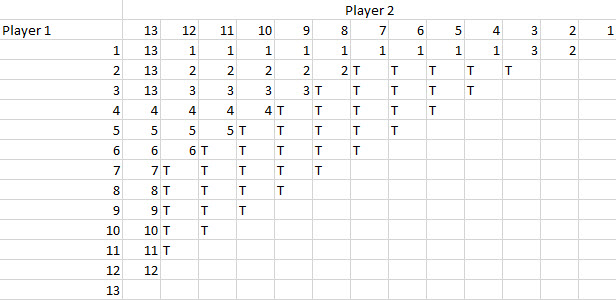Ask The Wizard #349
In the following diagram, what is the area of the blue region?

Click the button below for the answer.
Here is my solution (PDF).
This question is asked and discussed in my forum at Wizard of Vegas.
What is the average number of cards held after the draw in video poker?
The following table shows the average number of cards held in 10 different games and pay tables. The average of the games listed is 2.05.
Average Cards Held in Video Poker
| Game | Pay Table | Return | Ave. Cards Held |
|---|---|---|---|
| Bonus Deuces | 10-4-3-3 | 97.36% | 1.845550 |
| Deuces Wild | 25-15-9-5-3 | 100.76% | 1.926010 |
| White Hot Aces | 9-5 | 99.57% | 2.055630 |
| Super Double Double Bonud | 7-5 | 99.17% | 2.057280 |
| Double Double Bonus | 9-5 | 97.87% | 2.058390 |
| Triple Double Bonus | 8-5 | 95.97% | 2.072620 |
| Bonus Poker | 8-5 | 99.17% | 2.080610 |
| Jacks or Better | 9-5 | 98.45% | 2.081030 |
| Bonus Poker Deluxe | 8-5 | 97.40% | 2.150470 |
| Double Bonus | 9-6-5 | 97.81% | 2.173550 |
In a chess tournament, each contestant plays a match against every other contestant. Each contestant gets 1 point for every match he wins, 0.5 points for every tied match, and 0 for every game he loses.
At the end of the tournament, it is seen that all competitors got a different number of points and the last competitor in the score ranking defeated each of the top three competitors.
Accordingly, what is the minimum number of competitors participating in the tournament?
Let's call the number of players n.
I figure the last place player has only three wins, against the top 3 players, and lost every other game. That gives him 3 points.
I then figure every subsequent player in order of points as 0.5 more points than the previous one, in rank. That would give the highest ranking player 3+(n-1)/2 points.
Taking the sum of 3 to 3+(n-1)/2, by a 1/2 point per step gives us (((n+5)*(n+6)/2)-15)/2.
The total games played with n players is n*(n-1)/2, where everybody players everybody else, once. Each game results in one total point, to that is also the total points earned among all players.
Then solve for n:
(((n+5)*(n+6)/2)-15)/2 = n*(n-1)/2
((n+5)*(n+6)/2)-15 = n*(n-1)
(n+5)*(n+6)/2 = n*(n-1) + 15
(n+5)*(n+6) = 2*n*(n-1) + 30
n^2 + 11n + 30 = 2n^2 - 2n + 30
n^2 + 11n = 2n^2 - 2n
n + 11 = 2n-2
n=13
The following table shows a way this can happen. The body of the table shows the winner in all 78 games.

The following table shows the number of points of each player.
Total Points by Player
| Player | Points |
|---|---|
| 13 | 3 |
| 12 | 3.5 |
| 11 | 4 |
| 10 | 4.5 |
| 9 | 5 |
| 8 | 5.5 |
| 7 | 6 |
| 6 | 6.5 |
| 5 | 7 |
| 4 | 7.5 |
| 3 | 8 |
| 2 | 8.5 |
| 1 | 9 |
This question is asked and discussed in my forum at Wizard of Vegas.




